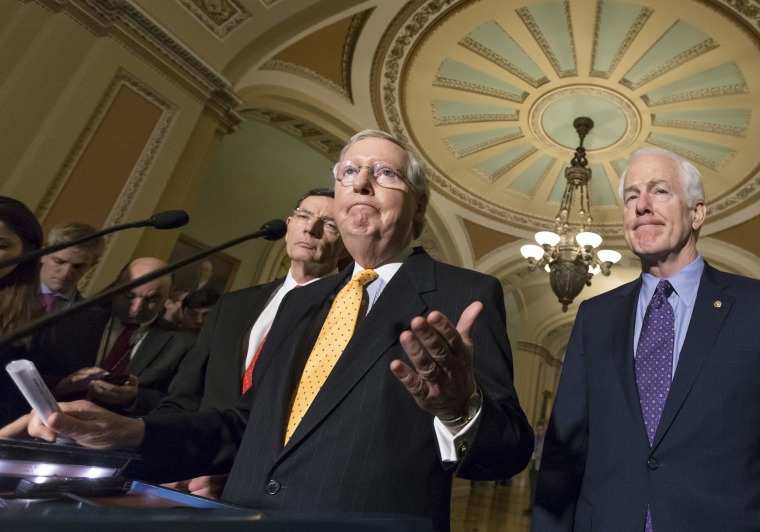As things stand, Senate Republicans are eager to pass a health care plan that doesn't exist, but Reuters reports that GOP lawmakers intend to finalize a proposal this afternoon.
Republicans leaders hope a so-called skinny bill, which repeals a few key provisions of Democratic former President Barack Obama's signature healthcare law without being a far-reaching overhaul, can draw enough votes to pass despite unified Democratic opposition. [...]Republican senators were expected to hammer out provisions of the measure during a policy lunch on Thursday, giving lawmakers scant hours to digest its provisions before voting. Republican leaders have been sending pieces of the legislation to the non-partisan Congressional Budget Office to assess its impact and determine whether it complies with Senate rules.
There's no word as to whether senators will literally use the backs of envelopes and handy cocktail napkins while writing their legislation.
It's tempting at this point to start delving into the details of what we think we know about the "skinny repeal" bill, but I'm afraid it's folly. Every few minutes, new scuttlebutt points in new directions. We should have a better sense of the legislative specifics fairly soon.
But it's worth pausing to appreciate how truly ridiculous the circumstances are. Congressional Republicans have been working on their alternative to the Affordable Care Act for seven years. And yet, in true post-policy fashion, GOP senators intend to scribble some ideas down over lunch on a Thursday afternoon, and then pass it on a Thursday night or Friday.
This is not how policymaking is supposed to work in the United States. Contemporary Republicans simply don't care.
We don't yet have a firm head-count on the incomplete bill, but what's also intriguing right now is that GOP officials can't agree among themselves about the underlying point of this legislation.
According to some, the "skinny" bill is a way to narrow the focus of the party's repeal crusade, leaving Medicaid intact. According to others, the bill is practically meaningless -- because it's merely a vehicle to a conference committee, where House and Senate negotiators will write an entirely different, final piece of legislation.
As Matt Yglesias explained this morning, there are two serious problems with this.
One is that even as the Senate GOP caucus appears to be coalescing around the skinny repeal strategy, its members cannot agree as to which version of the strategy they are pursuing.The other is that neither interpretation accords at all with Senate Republicans' stated public commitments. A critical mass of Republican moderates has stated clear and unequivocal objections to BCRA-style steep Medicaid cuts. That, if we take them seriously, would rule out the second version of the skinny strategy. At the same time, all Republicans complain that Obamacare's exchanges are too unstable. That, if we take them seriously, would rule out the first version.And yet ahead they go.
My suspicion is that Mitch McConnell is telling his members that this new Senate bill shouldn't be taken too seriously. This is just about keeping the process going, he's saying. If this fails, the process fails, so the Senate should just pass this and allow a conference committee to work towards a different solution.
But even this pitch is predicated on the assumption that the House won't simply pass the Senate bill, which could happen. It's also based on the idea that if a conference committee is formed, the end result will be tolerable to all of the various GOP factions, which is an idea that's very hard to take seriously.
Postscript: There's been a fair amount of commentary this morning, suggesting the use of the word "skinny" is itself a mistake, because it suggests the legislation wouldn't do considerable damage. That's a very fair point. While we wait for the secret Republican bill to emerge, keep in mind that the rumored contours of the plan have the capacity to impose systemic harm, affecting millions of people.
